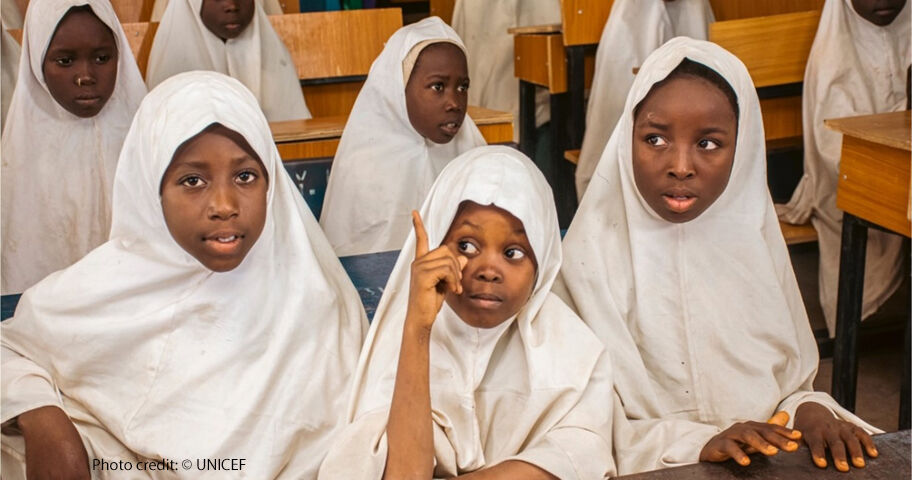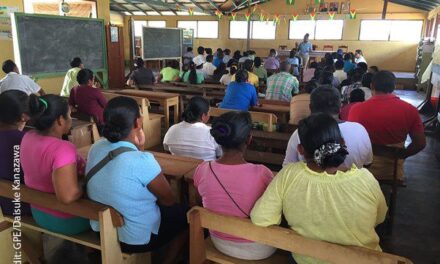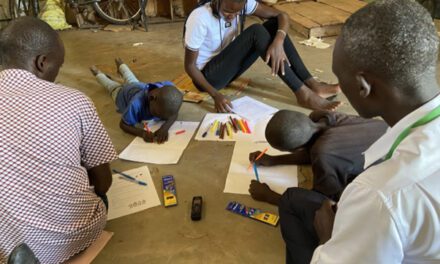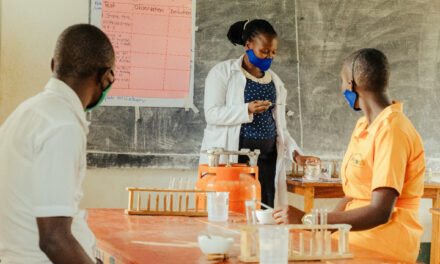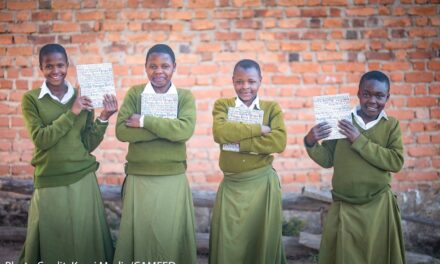This article was written by UNICEF Nigeria and the UK’s Foreign, Commonwealth & Development Office (FCDO).
Nigeria is committed to realising the rights of all children and achieving their full potential by building strong foundations. The core of UNICEF’s and FCDO’s education work in Nigeria is partnering with the government to address demand- and supply-side barriers to both access and learning. We focus on reaching marginalised children, especially in the north, where humanitarian crises threaten education.
Why is it worth talking about girls’ education in Nigeria?
The child population in Africa is estimated to reach 750 million by 2030, the same year by which the world has committed to achieving the Sustainable Development Goals. The SDGs envision a world in which every child is going to school and learning the skills needed to thrive at home, in their communities and in the workplace. Yet as we surpass the mid-point to 2030, 244 million children and youth globally, and 57 million in West and Central Africa alone, remain excluded from education, according to UNESCO.
Nigeria, with its burgeoning child population of over 110 million and growing, will account for 17 per cent of the children in Africa and 5 per cent of the children in the world by 2030. What happens to children in Nigeria matters significantly to regional and global development, and the world is watching closely.
In the past decade, the country has made notable progress in realising the right to education for children. The persistent out-of-school problem and the growing learning crisis means that the education agenda is far from complete. Looking back to 2012, the picture was much more sobering. At least 1 in 3 children, mostly girls and mostly in the north, were out of school (compared to 1 in 4 in 2021), and very little learning was taking place. Addressing this severe deprivation required innovative, comprehensive and holistic approaches implemented through strong partnerships from the local to the national levels.
Enter the Girls Education Project Phase III (GEP3)… This innovative programme, implemented by the Federal Government of Nigeria and six northern states, with the support of UNICEF and the UK’s Foreign, Commonwealth and Development Office (FCDO), brought 1.5 million girls into school, narrowed the gender gap and improved learning from 2012 until 2022.
This level of impact is not achieved by chance but by intentional, evidence-driven planning and sustainability-focused design. Now, the Federal Government of Nigeria, FCDO, and UNICEF are coming together at the 2023 UKFIET conference to share what they have learned through the symposium, “Advancing girls’ rights to education in Northern Nigeria”.
What does the symposium programme offer?
The programme will reflect on how GEP3 enabled girls and women in northern Nigeria to overcome stereotypes and journey from the margins to the centre of social and educational life. We will explore how they turned dreams into reality by enrolling in school, completing basic education and being empowered with the knowledge and skills for life and work.
The symposium will share evidence and learnings from a series of rigorous research studies conducted under the auspices of GEP3. We will explore findings from an independent evaluation of GEP3, an implementation assessment of the Reading and Numeracy Activity (RANA) and a study on language in education to show how GEP3 brought girls into school, improved literacy rates and narrowed the gender gap, effectively breaking the shackles of illiteracy for girls and women in Northern Nigeria.
We will explore which interventions and strategies were effective for increasing household investment in education for girls, mitigating dropout and bridging learning gaps to strengthen both Hausa-language and English literacy, while helping shift deep-seated social norms to strengthen community support for girls’ education.
In addition, the symposium will present evidence on what works to address the learning crisis in Nigeria and provide an opportunity for participants to engage in a robust discussion on effective approaches to improve foundational learning.
This symposium will uniquely link the research findings with first-hand experiences from the field to:
- Situate evidence on what works within the lived context of girls in northern Nigeria through first-hand video and in-person accounts from beneficiaries;
- Discuss factors which enabled GEP3 interventions to drive girls’ education access and learning; and
- Identify remaining gaps, strategic levers and next steps to take evidence-based models to scale.
What can you look forward to in the symposium?
Drawing on a diverse mix of speakers and discussants, ranging from Nigerian government officials, female leaders from civil society and adolescents to researchers, the symposium will unpack the strategies and successful interventions that bring girls to school and support their learning. Ms. Aisha Muazu, a GEP3 participant and a global advocate for girls’ education, will moderate a panel highlighting effective models for getting out-of-school children into school and what it will take to bring these models to scale. The session will also feature videos of communities and beneficiaries showcasing the tangible impact of GEP3 interventions.
Join us at the symposium ‘Advancing girls’ rights to education in Northern Nigeria’ on 12 September at 4pm in Room 10. We hope to see you there!

